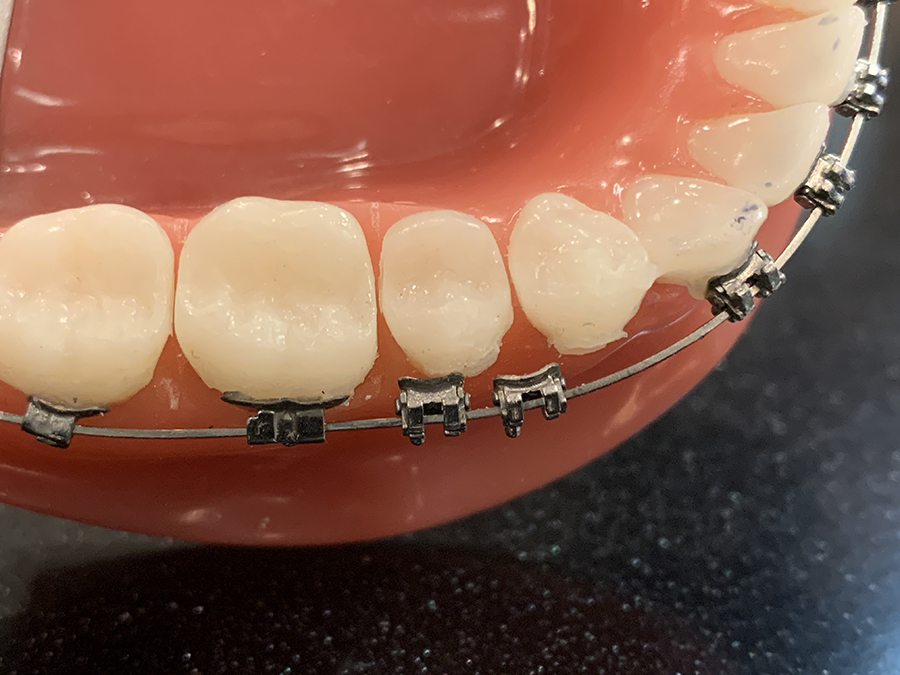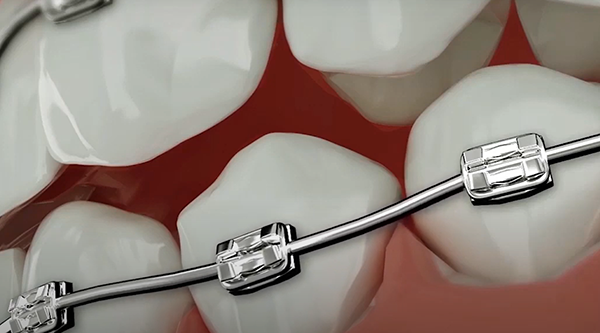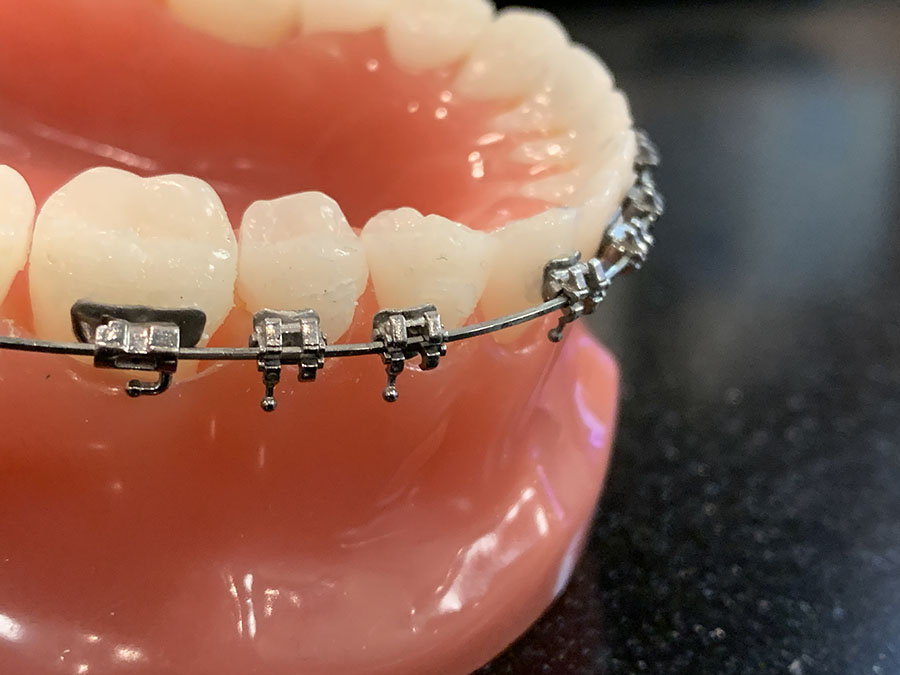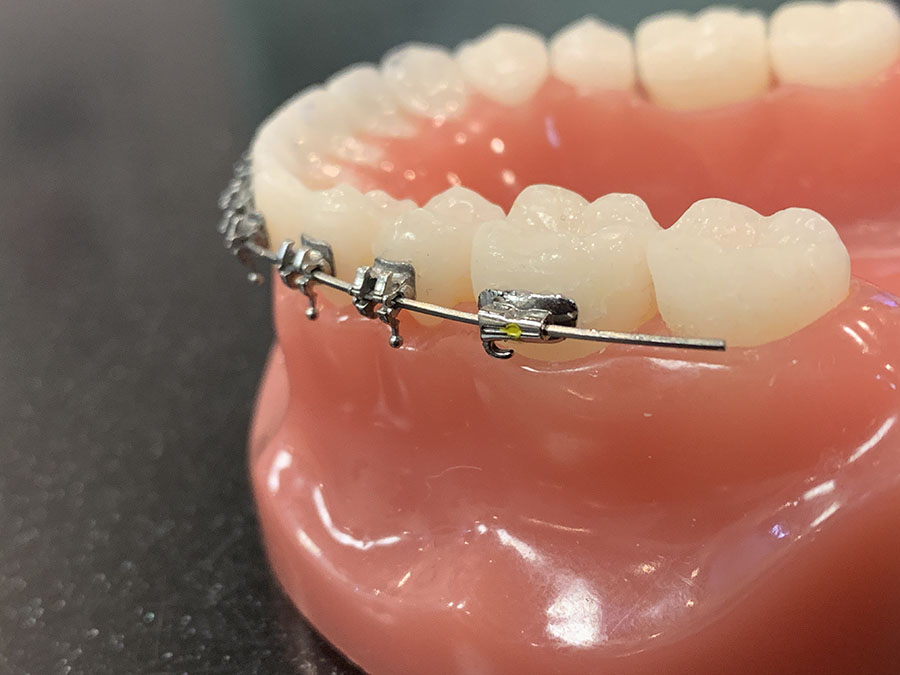
Broken Brackets – What You Need to Know
By Dr. Tyler Coles – Premier Orthodontics
Table of Contents
“What should I do if I have a broken bracket?” — That’s one of the biggest questions orthodontic patients have. Broken brackets – sometimes called loose brackets or floating brackets – happen a lot of the time with braces and is something that almost every patient will experience.
In this article, we’ll discuss everything you need to know about broken brackets or broken braces, as well as how to manage them.
What does a broken bracket look like?
You’ll have an easy time picking out a broken bracket.. The bracket will no longer be attached to your tooth; it will move or slide along the arch wire. Sometime the bracket will spin around as well.

A broken bracket most commonly stays on the arch wire and slides around. If one of the brackets in the back is broken, it may slide off the archwire and into the back of your mouth. Now, there’s no need to worry. If this happens, just take the bracket out of your mouth. If you happen to swallow the bracket that’s okay too! It happens 🙂
What causes a broken bracket?
There are so many reasons why a bracket may break. Sometimes it’s about how you are taking care of your braces. Other times it’s the result of the bonding process at the orthodontist office.
Here’s a few ways that the person wearing braces might cause one to break:
- Repeatedly biting into food that is too hard, crunch, or sticky (ice, chips, pretzels, laffy taffy)
- Grinding your teeth at night and putting too much pressure on your braces
- Getting hit in the mouth while playing contact sports or another physical activity.
- Playing around with your brackets too often
- Having a “deep bite” that causes your top teeth to bite down on top of the lower brackets
If none of those items apply to you, it’s possible that the broken bracket was caused by something that happened during the bonding process at the orthodontist office.
Here are a few things that could cause a weaker bond of the braces during the bracket bonding process.
- The teeth got wet during the bonding process. Any amount of saliva on the teeth can weaken the bond. It can be difficult to keep all the teeth dry in the mouth.
- The teeth weren’t totally clean during the bonding process. Any amount of plaque, food, or tartar on the teeth can weaken the bond of the braces. Orthodontists generally clean the teeth off prior to bonding the braces, but there are times when one of the teeth may not be cleaned sufficiently.
- The brackets got bumped or moved during the bonding process. This is especially common with young children who have a hard time sitting still. If the braces or bumped or shifted while bonding, it can weaken the bond.
As you can see there are so many factors behind a bracket breaking – but no matter what caused it, know that IT IS OKAY! Broken brackets are not a big deal and they are not an orthodontic emergency. Almost every orthodontic patient has at least one broken bracket during treatment and orthodontists are used to fixing brackets for their patients….
…so if you or your child has a broken bracket, don’t stress!
Does a broken bracket hurt?
Generally speaking a broken bracket doesn’t hurt. It might feel a bit annoying as it slides around on the wire, but usually there’s not too much discomfort with it.

If one of the brackets on the back teeth breaks, it may expose the end of the archwire. This poking archwire can cause discomfort and may irritate the cheek.

What should I do if I have a broken bracket?
If you have a broken bracket, there are some remedies you can try at home to make it feel better and eliminate any discomfort. If a bracket is sliding around, simply place some wax over top of the bracket and secure it to the tooth. This should prevent the bracket from moving and eliminate any annoyance or discomfort.

If you have a poking archwire from one of the back brackets coming off, you can try to cut the long wire using some fingernail clippers. This method works best with a small archwire.

If you aren’t able to cut the archwire yourself, you can place a small ball of orthodontic wax over the top of the wire to keep it from poking your cheek.
The best way to get the orthodontic wax to stick is to first dry the area off with a tissue, and then apply the wax. If the wax doesn’t stick, you can also place sugar-free gum over the top of the bracket or wire to eliminate discomfort.
Watch this video to learn more about what you should do if you have a broken bracket:
How long can you go with a broken bracket?
If you have a broken bracket and it’s not causing any discomfort, there’s not an urgent need to get it fixed. You can usually wait several days or even weeks to have it repaired without any negative effects on your treatment.
If you are having discomfort or are concerned about the bracket, you should contact your orthodontic office. Most orthodontic offices will set aside appointments during the day for bracket repairs and can get you in to have your bracket repaired within a few days.
Having a broken bracket isn’t an emergency and it doesn’t have to be fixed that exact same day. Using wax or sugar-free gum can eliminate discomfort until you are able to get an appointment.
How to fix a broken bracket
Fixing broken brackets is not something you can do on your own. Even though it’s not urgent, you will need to visit the orthodontic office.
Usually a bracket repair appointment is a quick and simple process Here’s what happens:
- The bracket is removed from the archwire.
- The bracket is cleaned and sanitized.
- The tooth surface is polished and any bracket adhesive is removed.
- The tooth is prepared for orthodontic bonding (the same process that was used when the braces were first put on).
- The bracket is bonded to the tooth.
- The archwire is reactivated.
The entire repair process usually takes just 5-10 minutes.
Do orthodontists charge for broken brackets?
Every orthodontist is different and will decide on their own fees. At Premier Orthodontics we generally do not charge for broken brackets. We understand that broken brackets happen, and we plan on these visits as part of the braces process.
The only time that we might consider charging for broken brackets is if the number of broken brackets is getting out of hand. For example, if you or your child is continuing to eat hard, crunchy and sticky foods (despite being told not to) and causing 5+ broken brackets at a time, then we may notify you that a fee will be charged next time. Luckily, this almost NEVER happens 🙂
If you follow your orthodontists’ instructions about braces, then you shouldn’t experience broken brackets too often.
What can I do to avoid broken brackets?
If you are in braces, the easiest way to avoid broken brackets is to:
- Avoid hard crunchy and sticky foods
- Avoid fidgeting with your brackets or wires
- Do not bite pens, pencils, or other hard objects
- Wear a mouthguard while playing sports
- Let your orthodontist know if you find yourself biting on your braces
Braces in Phoenix, Chandler, Maricopa, and Casa Grande
Premier Orthodontics has 6 locations providing braces and Invisalign in Phoenix, Chandler, Gilbert, Maricopa, Casa Grande, and Glendale as well as the surrounding areas.
Schedule your free consultation for braces or Invisalign or read our comprehensive guide to the cost of braces . (We are very transparent about our process and our pricing, as you’ll see in this guide.)
Schedule a Free Braces Consultation For You or Your Child
Thinking about getting started with braces?
You can schedule a 100% free consultation and find out if clear braces the best choice for you.
Whether you’re thinking about braces for kids, braces for an adult, or even Invisalign, we’ve got you covered!
Click below to learn how you can get started with braces for as low as $89/month.


